You can export retail transaction data from Retail Express in formats compatible with MYOB AccountRight desktop software, enabling integration with this popular Australian accounting platform even without real-time connectivity. This helps optimize your accounting workflows by providing structured data exports that can be imported into MYOB AccountRight, reducing manual data entry while working with desktop accounting software.
Exporting data for MYOB AccountRight involves generating formatted files containing sales, purchases, and other financial transactions that conform to MYOB's import requirements. When you use accounting data export properly, you can expect significantly reduced manual accounting entry, consistent data formatting supporting reliable imports, maintained financial accuracy through structured data transfer, time savings for accounting processes, and flexibility to synchronize accounting on your preferred schedule.
Version Note: The Accounting Data Export feature exports MYOB files formatted for direct upload to MYOB Desktop v19+ and MYOB AccountRight 2018+.
The Accounting Data Export window provides access to the setup files for the integration as well as the data files that contain the information from a date range.
Creating the Accounting Data Export Files
Before you begin
Before you can use the Retail Express Accounting Data Export (formatted to work with MYOB AccountRight) you will need to ensure the following items have been completed:
- Create a MYOB File
- Update your MYOB Payment Methods
If the Payment Method names don't match between each system you will encounter errors during the import of transactions
📋 Note: MYOB is case-sensitive, so you will need to match the formatting exactly as per Retail Express e.g. VISA is not the same as Visa.
Check the names in Retail Express
- Log into Retail Express
- Navigate to Settings > Payment Types
- You will see a list of payment types in a table:
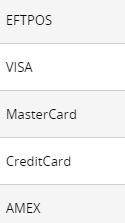
For detailed information on this screen refer to the Settings - Payment Types article
Update the Payment Method names in MYOB
- Open MYOB
- Navigate to Lists > Sales and Purchases Information > Payment Methods
- You will see a list of your existing Payment Methods
- Double click a Payment Method to open it for editing
- Update the Payment Method name
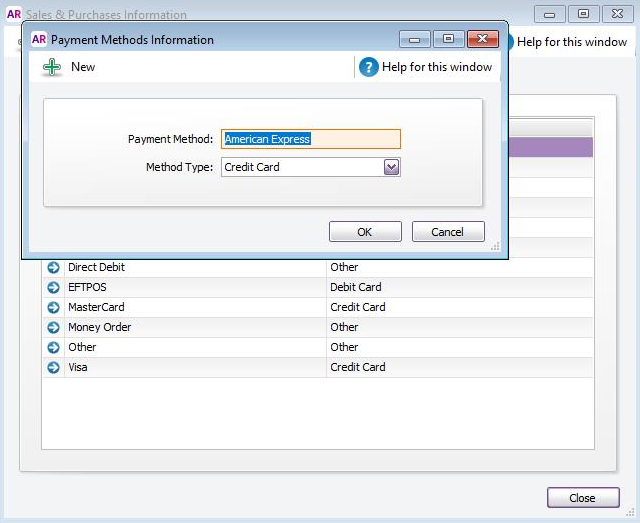
- Click OK
For assistance with MYOB setup, see: MYOB - Create a Payment Method or contact MYOB Support directly.
Step 1 - Download the Setup Files from Retail Express
Retail Express exports the setup files in a compressed format so the file is smaller and faster to download. Before importing these files into MYOB, these files will need to be extracted.
📋 Note: If you don't extract the files you will be unable to import the files into MYOB.
To download and extract the setup files ready for MYOB:
- Navigate to Settings > Integrations > Accounting Data Export
- Ignore the filters (these are used later when exporting data, not the Setup files)
- Click Download Setup Files
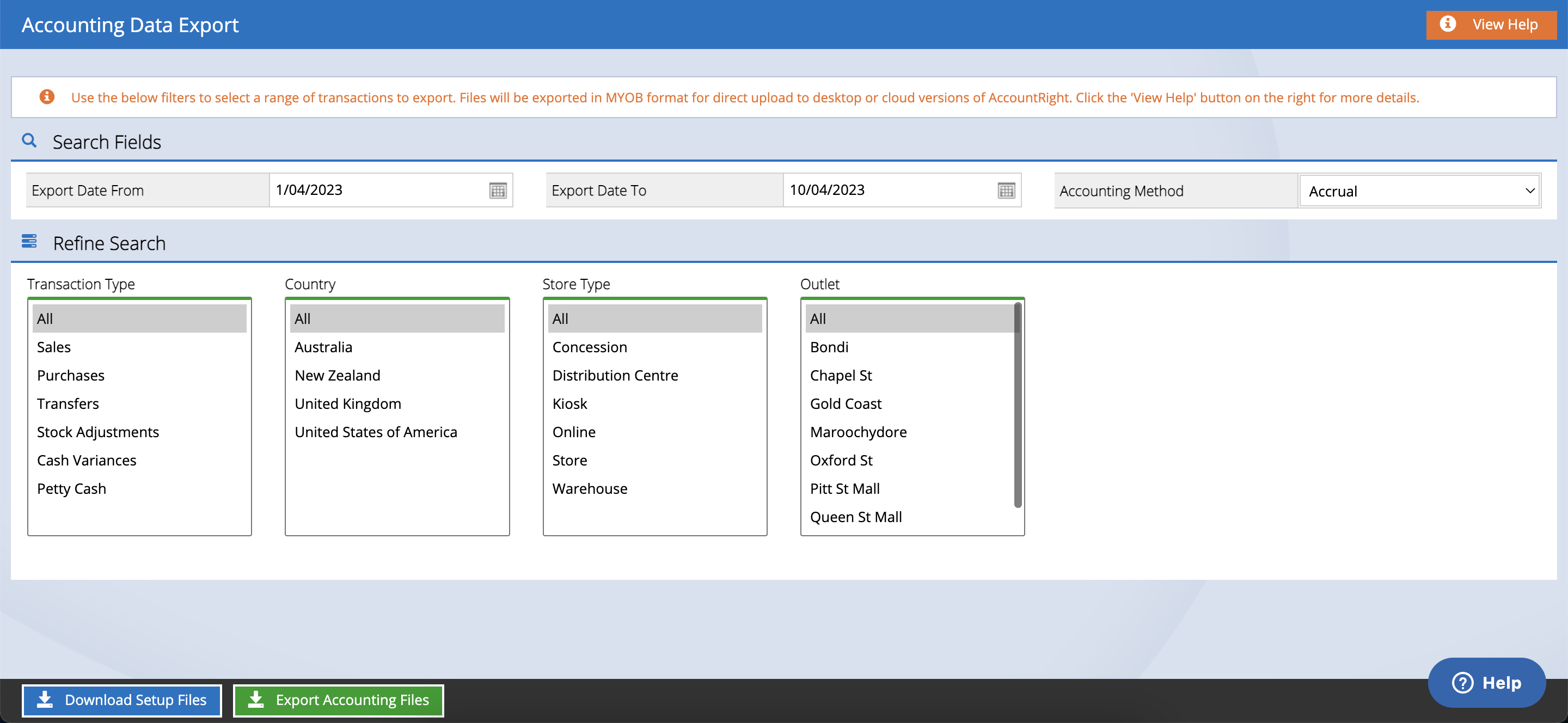
- Click Save or Save As
- Browse to your preferred location
- Click Save
- Open the location where your files were downloaded
- Right-click the downloaded file
- Select Extract All
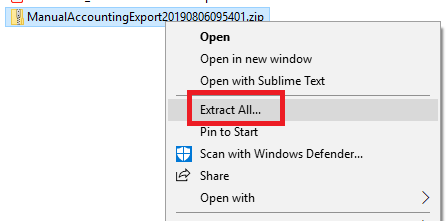
- Select a location for the files to be extracted to
📋 Note: Remember this location when selecting the files to be imported into MYOB
- Click Extract
You will see four .TXT files, the correct for direct import to MYOB. These files will be called either Accounts, CustomerCards, Jobs, or SupplierCards, with the date of the extract included in the filename.
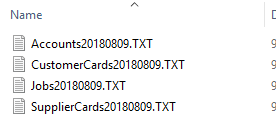
📋 Note: These files are exported as comma-separated values (CSV). If there are any commas (,) in your Outlet or Supplier names, you may receive errors on import.
Step 2 - Import the Setup files into MYOB
Each of the 4 setup files will need to be imported into MYOB, selecting the appropriate Import Field and Accounts Type during the import process.
Retail Express
Setup File | Sample Export Filename* | MYOB Import Field | MYOB Accounts Type |
| Accounts | Accounts20190806.TXT | Accounts | Account Information |
| CustomerCards | CustomerCards20190806.TXT | Cards | Customer Cards |
| Jobs | Jobs20190806.TXT | Jobs | - |
| SupplierCards | SupplierCards20190806.TXT | Cards | Supplier Cards |
* The file names will display different dates depending on the date the file was exported from Retail Express.
Click on the heading below for information on detailed steps on importing each of these files.
- Navigate to File > Import/Export Assistance > Import Data
- Click Next
- Select the MYOB Import Field of Accounts
- Select the matching MYOB Accounts Type field of Account Information
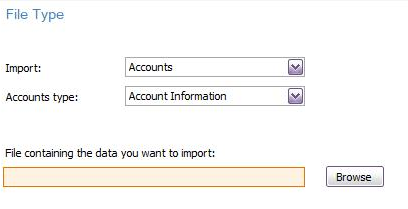
- Click Browse
- Navigate to where you saved the files in step 3, and select the Accounts file
- Click Next
- Select the "Data is separated by" option of Commas
📋 Note: These files are exported as comma-separated values (CSV). This means that if there are any commas (,) in your Outlet or Supplier names, you may receive errors on import.
- For the "The first line of the file contains" option select Headers or Labels
- For the "If data you are importing already exists in this company file" option select Reject the Import data
- Click Next
- Click Auto match
- Click Next
- You will be prompted to perform a Backup
📋 Note: We always recommend performing a backup at this point, should you need to restore data for any reason
- Once the backup has been completed, click Import
- The import will be processed
- If you need to import another file click Import more data, otherwise click Close
- Navigate to File > Import/Export Assistance > Import Data
- Click Next
- Select the MYOB Import Field of Cards
- Select the matching MYOB Accounts Type field of Customer Cards
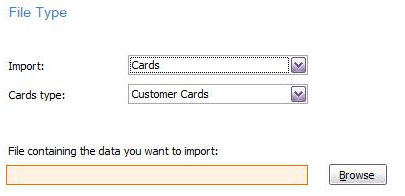
- Click Browse
- Navigate to where you saved the files in step 3, and select the CustomerCards file
- Click Next
- Select the "Data is separated by" option of Commas
📋 Note: These files are exported as comma-separated values (CSV). This means that if there are any commas (,) in your Outlet or Supplier names, you may receive errors on import.
- For the "The first line of the file contains" option select Headers or Labels
- For the "If data you are importing already exists in this company file" option select Reject the Import data
- For the "Match Cards using their:" option select Co./Last Name
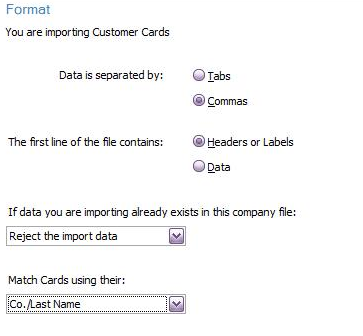
- Click Next
- Click Auto match
- Click Next
- You will be prompted to perform a Backup
📋 Note: We always recommend performing a backup at this point, should you need to restore data for any reason
- Once the backup has been completed, click Import
- The import will be processed
- If you need to import another file click Import more data, otherwise click Close
- Navigate to File > Import/Export Assistance > Import Data
- Click Next
- Select the MYOB Import Field of Jobs
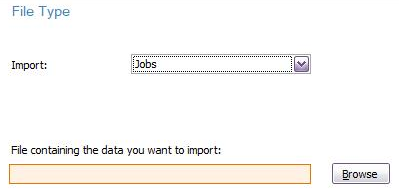
- Click Browse
- Navigate to where you saved the files in step 3, and select the Jobs file
- Click Next
- Select the "Data is separated by" option of Commas
📋 Note: These files are exported as comma-separated values (CSV). This means that if there are any commas (,) in your Outlet or Supplier names, you may receive errors on import.
- For the "The first line of the file contains" option select Headers or Labels
- For the "If data you are importing already exists in this company file" option select Reject the Import data
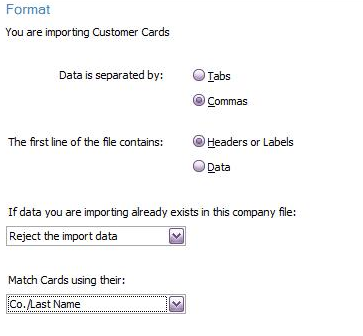
- Click Next
- Click Auto match
- Click Next
- You will be prompted to perform a Backup
📋 Note: We always recommend performing a backup at this point, should you need to restore data for any reason
- Once the backup has been completed, click Import
- The import will be processed
- If you need to import another file click Import more data, otherwise click Close
- Navigate to File > Import/Export Assistance > Import Data
- Click Next
- Select the MYOB Import Field of Cards
- Select the matching MYOB Accounts Type field of Supplier Cards
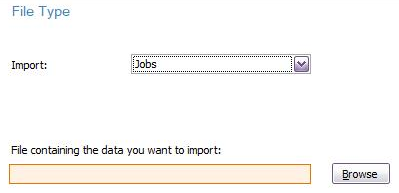
- Click Browse
- Navigate to where you saved the files in step 3, and select the SupplierCards file
- Click Next
- Select the "Data is separated by" option of Commas
📋 Note: These files are exported as comma-separated values (CSV). This means that if there are any commas (,) in your Outlet or Supplier names, you may receive errors on import.
- For the "The first line of the file contains" option select Headers or Labels
- For the "If data you are importing already exists in this company file" option select Reject the Import data
- For the "Match Cards using their:" option select Co./Last Name
- Click Next
- Click Auto match
- Click Next
- You will be prompted to perform a Backup
📋 Note: We always recommend performing a backup at this point, should you need to restore data for any reason
- Once the backup has been completed, click Import
- The import will be processed
- If you need to import another file click Import more data, otherwise click Close
General Ledger Accounts Created
The standard GL Accounts created in the setup file are as follows:
| Account Number | Account Name | Account Type |
| 19990 | RE Clearing | Bank |
| 19998 | RE Inventory | Other Asset |
| 19980 | RE Petty Cash | Other Asset |
| 19997 | RE In Transit | Other Asset |
| 19996 | RE Accounts Receivable | Other Asset |
| 29996 | RE Gift Voucher | Other Current Liability |
| 29998 | RE Duty | Other Current Liability |
| 29997 | RE Layby | Other Current Liability |
| 49995 | RE Surcharges | Income |
| 49996 | RE Freight | Income |
| 49998 | RE Sales | Income |
| 59998 | RE Cost of Sales | Cost of Sales |
| 59997 | RE Stock Adjustments | Cost of Sales |
| 59996 | RE Direct Costs | Cost of Sales |
| 59999 | RE Purchase Variance | Cost of Sales |
| 69997 | RE Cash Variance | Expense |
Frequently Asked Questions
During the import, you may encounter an error or a warning. Typically this means:
| Warning | The Import has continued but there is something you should be aware of e.g. Invalid Tax Code, default substituted |
| Error | There was an issue with the import so that it will reject those lines from the import (the remainder of the import will continue to be processed). |
If you review the error log there will be a code to help you identify the appropriate record affected by the warning or error.
For example, looking at the below import log, there was an error (id -24) related to the Brand Collective line (import did not continue), and a warning (ID 257) related to the Gibson Brands line (import continued)
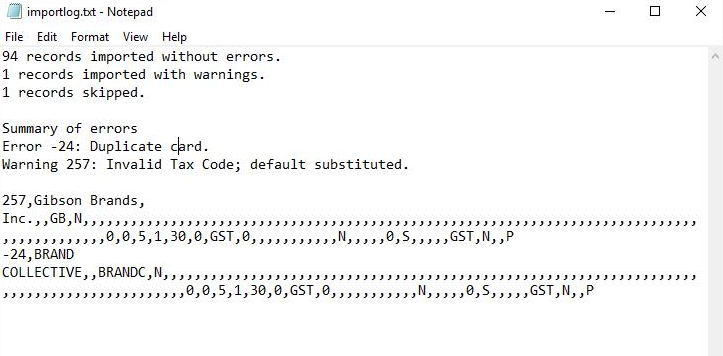
Export files from Retail Express
- Log into Retail Express
- Navigate to Settings > Integrations > Accounting Data Export
- Use the Filters as required to refine the results

- Click Export Accounting Files to export the selected transactions
- Click Start Processing
- The file will be created according to the selected options and filters.
- Once the file has been processed ready for download click Download Files

Filters
Most of the filters are self-explanatory, however, see the detailed information below for the more advanced filtering explanations.
| Field | Details |
| Export Date From/To | These dates are inclusive and relate to the date the transaction was entered into Retail Express e.g. if you entered a payment on the 1st of July but backdated the payment to 30th of June, you will need to extract the 1st of July to extract the payment. |
| Accounting Method | Only the Accrual Method is supported - please confirm this method suitability with your bookkeeper or accountant. |
Transaction Types
| Transaction Type | Details |
| Sales | Two files are generated for sales:
- ServiceSales will include a summarised daily transaction for stock fulfilled, as well as surcharges, layby, debtors and voucher movements.
- ReceiptPayments will include Summarised daily payments for all transactions, except for direct debits which upload individually.
|
| Purchases | The ServicePurchases file includes a summary per purchase order. Once received, a purchase will be created with total costs for items, miscellaneous costs and freight. Any duty applied to purchase orders will be in the GeneralJournal file |
| Transfers |
Inter-store transfers are included in the GeneralJournal file.
Transfers between stores will run through an ?In Transit? account on the date of dispatch at the sending store and the date of receipt at the receiving store
|
| Stock Adjustments | Included in the GeneralJournal file, consists of the buy price value for all adjustments including manual, stock take and mass upload. Cost adjustments will result in adjustments to correct stock value |
| Cash Variances | Included in the GeneralJournal file, journaled as a daily total to an expensing account |
| Petty Cash/Money In Money Out | Included in the GeneralJournal file, journaled as a daily total to a clearing account for expensing |
Extract the Export Files
Retail Express exports the files in a compressed format so the file is smaller and faster to download. Before importing these files into MYOB, these files will need to be extracted.
📋 Note: If you don't extract the files you will be unable to import the files into MYOB.
To extract the files:
- Open the location where your files were downloaded
- Right-click the downloaded file
- Select Extract All

- Select a location for the files to be extracted to
📋 Note: Remember this location when selecting the files to be imported into MYOB
- Click Extract
Uploading Journals
The GeneralJournals.TXT file will include:
- Stock adjustments
- Inter-store transfers
- Cash up variances
- Petty cash
- Duty on purchases
To begin the upload:
📋 Note: It is recommended that you take a backup of your MYOB file before performing any new import
- Open MYOB to the main screen

- Navigate to File > Import/Export Assistant
📋 Note: For MYOB Desktop navigate to File > Import Data > General Journal Entries
- Select Import Data
- Click Next
- Select General Journal Entries from the Import drop-down
- Click Browse

- Navigate to the location of the saved GeneralJournals.TXT file exported from Retail Express
- Click Next
- You will be prompted to configure the import format
📋 Note: once these settings have been selected initially they should remain selected automatically during future imports
- Select Commas from the "Data is separated by" option
- Select Headers or Labels

- Click Next
- The Match Fields screen will be displayed
- Select Auto Match
📋 Note: For MYOB Desktop select Match All

- Click Next
- You will be prompted to create a Backup prior to importing the data
📋 Note: We always recommend creating a backup prior to import
- Once the import is complete the Conclusion screen will be displayed providing a summary of the number of records imported successfully, and any warnings or errors.
- Click the link to view the log file if required

Uploading Purchases/Bills
To begin the upload:
📋 Note: It is recommended that you take a backup of your MYOB file before performing any new import.
- Open MYOB to the main screen

- Navigate to File > Import/Export Assistant
📋 Note: For MYOB Desktop navigate to File > Import Data > Purchases > Service Purchases
- Select Import Data
- Click Next
- Select Purchases from the Import drop-down
- Select Service Purchases
- Click Browse
- Browse to the location of the saved ServicePurchases.TXT file
- Click Next
- You will be prompted to configure the import format
📋 Note: once these settings have been selected initially they should remain selected automatically during future imports
- Select Commas from the "Data is separated by" option
- Select Headers or Labels
- Click Next
- The Match Fields screen will be displayed
- Select Auto Match
📋 Note: For MYOB Desktop select Match All
- Click Next
- You will be prompted to create a Backup prior to importing the data
- Once the import is complete the Conclusion screen will be displayed providing a summary of the number of records imported successfully, and any warnings or errors.
- Click the link to view the log file if required
📋 Note: As the discount and payment terms are held against the supplier in MYOB you will likely receive warnings that the default values have been used for these fields. This is expected as this information is not available for export from Retail Express.
📋 Note: If you have entered the same supplier invoice number on two different purchase orders in Retail Express, the second purchase order will be rejected by MYOB and you will have to enter it manually.
Uploading Sales
To begin the upload:
📋 Note: it is recommended that you take a backup of your MYOB file before performing any new import
- Open MYOB to the main screen

- Navigate to File > Import/Export Assistant
📋 Note: For MYOB Desktop navigate to File > Import Data > Sales > Service Sales
- Select Import Data
- Click Next
- Select Sales
- Select Service Sales from the Type drop-down
- Click Browse
- Browse to the location of the saved Servicesales.txt file
- Click Next
- You will be prompted to configure the import format
📋 Note: Once these settings have been selected initially they should remain selected automatically during future imports
- Select Commas from the "Data is separated by" option
- Select Headers or Labels
- Click Next
- The Match Fields screen will be displayed
- Select Auto Match
📋 Note:;For MYOB Desktop select Match All
- Click Next
- You will be prompted to create a Backup prior to importing the data
- Once the import is complete the Conclusion screen will be displayed providing a summary of the number of records imported successfully, and any warnings or errors.
- Click the link to view the log file if required
Related Articles
Reporting & Analytics:
Purchase Orders & Suppliers: